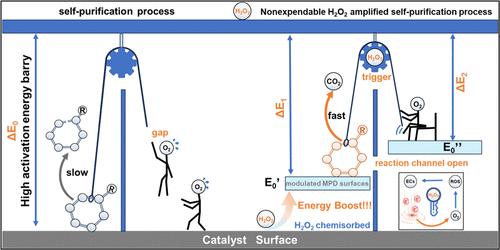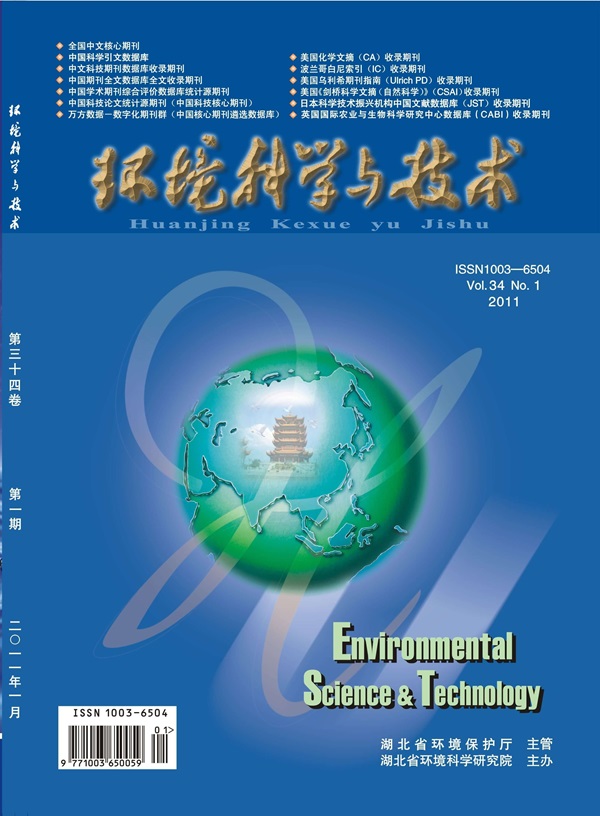Endogenous Substances Utilization for Water Self-Purification Amplification Driven by Nonexpendable H2O2 over a Micro-Potential Difference Surface
IF 10.8
1区 环境科学与生态学
Q1 ENGINEERING, ENVIRONMENTAL
引用次数: 0
Abstract
Natural self-purification of water is limited by mass transfer processes between inert oxygen (O2) and stable pollutants. This process must rely on large energy inputs and resource consumption, which have become a global challenge in the environmental field. Here, we greatly amplify this self-purification effect of natural dissolved oxygen (DO) by nonexpendable H2O2 triggering a DRC catalyst with a micro-potential difference surface. This low-energy strategy is mainly realized by lowering the activation energy barriers of endogenous substances and simultaneously opening the mass transfer channels over the Cu–ZnO surface. In this way, pollutant electrons and energy are efficiently utilized to activate DO. Surprisingly, the rapid degradation of the pollutants is accompanied by H2O2 consumption of only 2.6% at most, sometimes even reaching zero consumption, with the instantaneous absolute amount of H2O2 exceeding 100%. The typical endocrine disruptor BPA has been proven to be harmlessly degraded to small molecule alcohols and acids by self-purification amplification, including cleavage of stable contaminants on the catalyst surface, activation of natural DO, and enhancement of mass transfer between them.

水的自然自净受到惰性氧(O2)和稳定污染物之间传质过程的限制。这一过程必须依赖大量的能源投入和资源消耗,这已成为环境领域的全球性挑战。在这里,我们通过非消耗性 H2O2 触发具有微电位差表面的 DRC 催化剂,大大提高了天然溶解氧(DO)的自净作用。这种低能策略主要是通过降低内源物质的活化能障,同时打开 Cu-ZnO 表面的传质通道来实现的。这样,污染物的电子和能量就被有效地利用来激活溶解氧。令人惊讶的是,在污染物快速降解的同时,H2O2 的消耗量最多仅为 2.6%,有时甚至为零,而 H2O2 的瞬时绝对量则超过了 100%。事实证明,典型的内分泌干扰物质双酚 A 可通过自净化放大(包括裂解催化剂表面的稳定污染物、激活天然溶解氧以及增强它们之间的传质)无害地降解为小分子醇和酸。
本文章由计算机程序翻译,如有差异,请以英文原文为准。
求助全文
约1分钟内获得全文
求助全文
来源期刊

环境科学与技术
环境科学-工程:环境
CiteScore
17.50
自引率
9.60%
发文量
12359
审稿时长
2.8 months
期刊介绍:
Environmental Science & Technology (ES&T) is a co-sponsored academic and technical magazine by the Hubei Provincial Environmental Protection Bureau and the Hubei Provincial Academy of Environmental Sciences.
Environmental Science & Technology (ES&T) holds the status of Chinese core journals, scientific papers source journals of China, Chinese Science Citation Database source journals, and Chinese Academic Journal Comprehensive Evaluation Database source journals. This publication focuses on the academic field of environmental protection, featuring articles related to environmental protection and technical advancements.
 求助内容:
求助内容: 应助结果提醒方式:
应助结果提醒方式:


